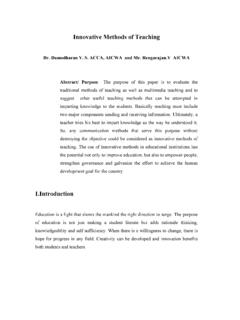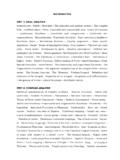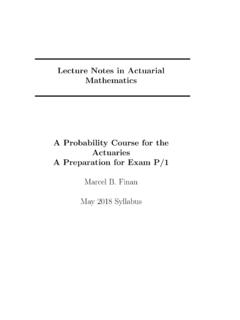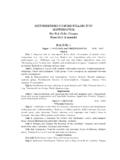Transcription of Math 520a - Homework 2
1 math 520a - Homework 21. Use Cauchy s integral formula (for an analytic function or its derivatives)to evaluate(a) For the contour (t) =eit, 0 t 2 , the integral eizz2dz(b) For the contour (t) = 1 +12eit, 0 t 2 , the integral ln(z)(z 1)ndzSolution:I ll just give answers for this one.(a) 2 (b) Integral is 0 forn= 1. Forn >1 it is ( 1)n2 i/(n 1).2. Letf(z) be an entire function such that there are constantsC, Dwith|f(z)| C+D|z|n, zProve thatfis a polynomial of degree at :Sincefis entire it has a power series about the origin whichconverges for (z) = k=0akzkThe coefficients are given byak=f(k)(0)/k!. We will show thatf(k)(0) = 0fork > n.
2 This impliesak= 0 fork > nand so the power series is just considering a circle of radiusR, Cauchy s inequality says|f(k)(0)| k!MRRkwhereMRis the sup of|f(z)|over the circle of radiusR. By the hypothesis,MR C+DRn. Fork > n, (C+DRn)/Rk 0 asR , and sof(k)(0) = 013. Let be a region (connected open set). Suppose thatfandgare analyticfunctions on such thatf(z)g(z) = 0 for allz . Prove that at least oneoffandgis identically zero on .Solution:We can find a pointz0 and a sequencezn which convergestoz0but never equalsz0. For everyn,f(zn)g(zn) = 0, and so eitherf(zn) = 0org(zn) = 0. So one of the sets{n:f(zn) = 0}and{n:g(zn) = 0}mustbe infinite.
3 Assume the first one is infinite. Then there is a subsequenceznkwithf(znk) = 0. But this impliesfis identically 0 on .4. Letfbe entire and suppose that for everyz0, the power series expansionaboutz0f(z) = n=0an(z z0)nhas at least one coefficientanwhich is zero. (Note that theandepend onz0.) Prove thatfis a polynomial. This is problem 13 on p. 67 in the can find a hint :Note that for the power series aboutz0,an= 0 is equivalent tof(n)(z0) = 0. So the hypothesis says that for everyz0there is annfor whichf(n)(z0) = 0. Now letAn={z:|z| 1, f(n)(z0) = 0}. The union of theAnis the unit disc and so is uncountable. So at least oneAnis uncountable (andhence infinite).
4 Letmbe such thatAmis infinite. Then there is a sequencezlof distinct elements inAm. Since the closed unit disc is compact, it hasa convergent subsequence. Sincef(m)vanishes on this subsequence,f(m)isidentically zero. Sofis a LetDbe an open disc. Suppose thatfis continuous onD, analytic onDand thatfnever vanishes onD. Suppose also that|z|= 1 |f(z)|= thatfis constant. This is problem 15 on p. 67 in the book. You canfind a hint :Discussed in Letg(t) be continuous on [0, ) with 0|g(t)|dt < . Definef(z) = 0cos(z+t)g(t)dtProve thatf(z) is entire. For complexz, cos(z) is defined to be (eiz+e iz)/2.(Caution: for complexzwe do not have|cos(z)| 1.]
5 2 Solution:Definefn(z) = n0cos(z+t)g(t)dtFor a fixedt,z cos(z+t)g(t) is entire. Also, cos(z+t)g(t) is jointlycontinuous intandz. By the theorem proved in class,fnis entire. We willprove it converges uniformly on compact subsets of the planetof. This willprovefis compact subset of the plane is contained in the strip|Im(z)| Mfor someM >0. So it suffices to prove uniform convergence on such a strip.|f(z) fn(z)|=| ncos(z+t)g(t)dt|Forz=z+iy, on the strip we have|cos(z+t)|=12|eiz+it+e iz it| 12(|eiz|+|e iz|) =12(|e y|+|ey|) eMHence|f(z) fn(z)| eM n|g(t)|dtThis bound holds for allzin the strip and the right side is independent ofzand goes to 0 asn proving the needed uniform Let be open.
6 Letfn, fbe analytic on and suppose that for all circlesCsuch that the circle and its interior are in ,fnconverges uniformly tofonC. Prove thatfnconverges uniformly tofon all compact subsets of .Solution:LetKbe a compact subset of . For eachz Kwe can find z>0 such thatB3 z(z) . (Note the factor of 3.) The discsB z(z) aszranges overKare an open cover ofK. (Note there is not a factor of 3 here.)So there is a finite subcover, , there arez1, , zn Ksuch thatK nj=1B zj(zj)Since there are finite number of discs in the cover, it suffices to show theconvergence is uniform on each disc. To simplify the notation, letB ( ) beone of the knowB3 ( ).
7 LetCbe the circle centered at with radius 2 .Then forz B2 ( ), we havef(z) fn(z) =12 i Cf(w) fn(w)w zdwIfz B ( ), we have|w z| forw Cand so|f(z) fn(z)| 12 1 |C|||f fn||Cwhere||f fn||Cis the sup of|f(w) fn(w)|overw Cand|C|is thelength ofCwhich is just 4 . So|f(z) fn(z)| 2||f fn||CNote that the right side is now independent ofzand goes to zero asn sincefnconverges uniformly tofonC. This completes the










![Revised Syllabus For B.Sc, Part III [Mathematics] (Sem.V ...](/cache/preview/d/b/6/0/d/d/1/e/thumb-db60dd1ea7378bffcc12e6f47a9540f5.jpg)



